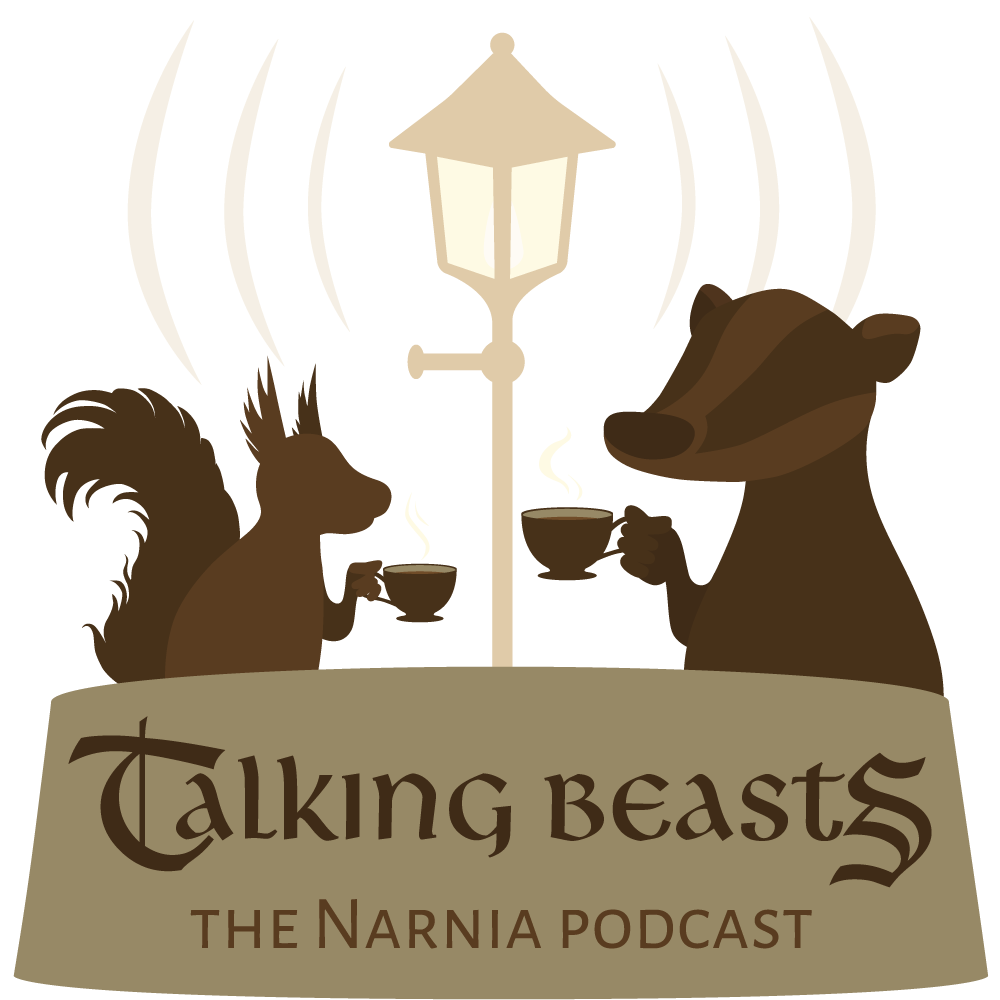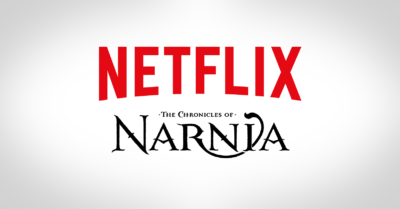Radio Cafe interviews Brian Sibley
NarniaWeb staff member Jints sent in the following transcript of the Radio Cafe interview with C.S. Lewis expert Brian Sibley and literary agent Katherine Ross. The interview originally aired on Radio Scotland’s “Radio Cafe” programme on Thursday, July 7th.
JF = Janice Forsythe, one of the hosts of Radio Cafe
KR = Katherine Ross
BS = Brian Sibley.
The audio is available from this page through next Thursday: The “Listen Again” function is in the upper right corner. Scroll down to “Radio Cafe”, and click on “Thu”. The interview starts almost immediately.
JF – So to those new adult editions of the Chronicles of Narnia by CS Lewis. Generations of children have been enthralled by the extraordinary world that lies on the other side of a piece of bedroom furniture. Fantastic creatures, bloody battles between good and evil, treachery, friendship and love; they’re all packed into one book; The Lion, the Witch and the Wardrobe, which Lewis wrote in 1949. Six more books followed, each hailed by critics and readers alike as a masterpiece. Well, 55 years later, Harper Collins has published the first editions aimed specifically at adults. This statement from David Brawn, the company’s publishing director, explains why.
`We had wanted for some time to publish adult editions of the Chronicles of Narnia, particularly since The Lion, the Witch and the Wardrobe was voted the nation’s ninth most popular book in the BBC’s Big Read – a huge poll of largely adult readers, and a massive achievement for a 50-year-old book, often categorized as a work only for children. CS Lewis’s books are rightly regarded as classics, and there’s a long tradition of people re-reading the books when older and discovering many more layers to the stories than they were aware of as children. To enable this to happen, you have to make the books as attractive and pertinent as possible for your potential audience, otherwise you can deny them the chance to join in. Obviously, we wouldn’t alter the text in any way, but we thought it would be appropriate to include a background essay as the back of the seven books, each focussing on a different aspect of Lewis and his work.’
JF – That statement from David Brawn of Harper Collins. Now it all sounds very worthy, but is there anything more to this than another exercise in repackaging?
I’m joined now by literary agent and children’s book consultant Katherine Ross and, on the phone, writer and broadcaster and CS Lewis expert Brian Sibley.
Brian, first of all, huge sighs of relief all round, I think! There may be more than a touch of the dominatrix about the Ice Queen; nothing salacious though about these adult editions! In fact, it would seem, not much that’s different at all. Do you think this is just a marketing thing?
BS – Well, evidently it is a marketing ploy in one sense, but if it works – and it certainly worked with Harry Potter because the publishers of the Harry Potter books have consistently brought the books out with kid-friendly covers and adult-friendly covers – then I think it’s no bad thing, if it enables people to rediscover books, or even discover them for the first time and they’ve never tried to read them before, then what harm is there in it? The only danger I think, in a way, is just in looking at covers as though they are in some way the object itself, when in fact of course it’s what’s inside the covers that really matters. I guess what it reflects is the fact that we live in a world where there are so many books being published, bookshelves in bookshops that are actually groaning with books, and books stay on these shelves for a very short period of time before another lot come in, that publishers feel that they really just have to hit the market where they can and get those books off the shelves.
JF – What do you make of this, Katherine Ross? I mean it’s very nice; Harper Collins are clearly going to clean up with this, they hope. I suppose it’s no bad thing because not every adult has a tame child that they’re going to be reading the book to, so I suppose it’s a nice way for them perhaps to come across a book they didn’t have a chance to read themselves as children.
KR – That’s very true, I agree with Brian; I don’t think you can say there’s anything uniquely bad about it in any way at all. I think the more people who read them, the better! I have to say that they sell in their millions anyway, and whether they actually need to have this new edition or not, financially, is another matter of course, but I think any opportunity to get them out to a new audience had got to be welcomed. I’m an old-fashioned girl; I like the old editions, I like the Pauline Baynes, lovely illustrations on the inside so I’m kind of disappointed to open up The Lion, the Witch and the Wardrobe and not see any illustrations inside. But of course you do get these bonus extras, a bit like a DVD; there’s an essay at the back and there’s the first chapter of the next book of the series and there’s a readers guide as well – a sort of reader’s group guide, which actually makes it a little bit like a schoolbook, I felt, really. I think the fact is, of course, that the film is coming out at the end of the year, so it’s a tie-in for that and I think it’s a very clever thing to do, to bring it out with this strapline of `Read it before you see it’. I think, you know, `why not?’.
BS – Well, Harper Collins are of course also well aware because they also publish the works of JRR Tolkien; they’re well aware of the fact that when Peter Jackson’s movies of the Lord of the Rings came out that they sold a phenomenal number of the books, and in fact it was impossible to travel on a train or a bus without seeing someone with the Lord of the Rings around the time that the film came out. So films do generate an interest in people, whether people of course stick with the book or whether they give up on it is another matter, but they do encourage people to actually look at the books.
JF – It’ll be interesting though, won’t it, to find out what happens when this films comes out at the end of the year because, of course usually with film tie-ins new covers come out featuring the scenes and actors from the film. In a way, they’re kind of pre-empting this because you’d think the scenes from the film would attract both children and adult readers.
KR – I think that’s right actually, I mean I can see them doing it all over again when the film actually does come out, but they are getting in quite early with these new editions and they should sell a good number of them before the film actually comes out.
BS – I think there’s probably a publishing story here in the sense that you really can’t put that kind of imagery on a book without paying the film company, so it’s not just something that the publishers can do and just sell more copies, they actually have to pay for the privilege, and I don’t know, but I would imagine that maybe the bill for that was maybe too high for Harper Collins.
JF – Indeed, you’re possibly right there. Katherine, there seems to be – I think in a sense it’s been sparked off by the Harry Potter phenomenon… certainly friends of mine, they couldn’t care less whether they’re reading the adult edition that ‘makes it OK’ or not; they’re quite happy to be seen with their nose in the edition that’s aimed at children – and certainly there seems to be a kind of shame about this, adults reading books that are originally intended for kids.
KR – I think that’s absolutely true and I think that many of us would find nothing difficult at all about sitting on a bus or a train and sitting reading a book that’s obviously a children’s book. But apparently Harper Collins have discovered that there are many people who are put off that and I think particularly with something like the CS Lewis books – The Lion, the Witch and the Wardrobe and all the other Chronicles of Narnia – they are quite childlike-looking, the books, especially with the Pauline Baynes’ illustrations, so perhaps that makes them feel an adults just would not go for them. I like the idea that these will be read by adults who don’t have children to read them to; I think that’s a market that perhaps hasn’t been thought of in quite that way before, and I certainly would like to see if you are going to read them with children I’d really hope that you would use the ones that have the illustrations in them; there’s so much more to share there.
JF – This is something you are very passionate about, isn’t it?
KR – Absolutely, yes, the whole sort of sharing of books together and of course giving them – adults and children – the opportunity to read the same books, I mean, obviously that opportunity is there already; simply putting them in a different cover isn’t suddenly giving them that opportunity, but it might make more adults, who perhaps are aunts or uncles or Godparents or whatever, who haven’t come across the books in their own childhood actually go back to them and then decide that yes, they’d like to share them with a child as well.
JF – Brian, I’m wondering whether there’s a male—female divide here; clearly Katherine and I are both fans of the original Pauline Baynes illustrations…
BS (interrupting) –No, not at all, I have the privilege of knowing Pauline Baynes and I’ve known her for a number of years and she’s a friend of mine and I adore her pictures and her images of Narnia are, in my mind, what Narnia is whenever I think of the place, so no, it’s, I think, to do with the fact of whether you know the illustrations or whether you don’t.
JF- But don’t you think…
BS (continuing) – I think I’ve cracked another marketing possibility though; I recently bought, from America, the unauthorised autobiography of Lemony Snicket, the man who wrote `A Series of Unfortunate Events’, and that book is very carefully and cleverly packaged, because it looks rather dour in a piece of what looks like brown wrapping paper, but inside the brown wrapping paper there is a alternative cover. Because Lemony Snicket doesn’t really want you reading this very depressing book, and people seeing it, you take the cover off, you turn it round and you put it back on the book and it has a lovely gay picture of three kids sitting on a pony and it’s called `The Luckiest *laugher drowned out the next word(s)* in the World’ and there’s cakes and balloons and flowers and rabbits and it’s ideal, and I thought, why don’t the publishers who publish the Booker-listed prizes just produce the covers, and we can put them round our thrillers or our romances or even our copies of The Da Vinci code if we liked, and not only can we get away with reading whatever we want to read, but we can look as though we’re actually reading the latest really hip novel!
JF – I think you could be on to something there! What a cynic he is, Katherine, but I think he could definitely clean up!
K – I think that’s a brilliant idea, definitely
* The discussion at this point turns to other marketing ploys and design of covers in general. Nothing to do with CS Lewis is mentioned and my hand was very sore at this point so I stopped for a break….the conversation then turns to how worked up designers and publishers are now with `PC’ (politically correct – not Prince Caspian!) designs for book covers and how efforts had been made to `update’ certain characters.…*
K – … funny you [JF] should say mention that; I was looking on the – rather good, in fact – Narnia website, talking about `PC’ things, and noticed that as you go through that wardrobe, it’s not fur coats you go through, and I thought that was a terrible shame, because that’s part of the magic of the wardrobe of course, that it is fur and it’s obviously real fur and he actually says it’s one of the things that Lucy loves best is the feel of fur.
JF – What on earth is it now?
KR – Well it’s just ordinary, I mean it looks to me like, well very nice looking coats, but they’re sort of cloth coats as far as I can make out; they’re certainly not fur!
BS – It’s a vitally important pun because the fur coats become fir trees *noises of realisation dawning come from JF and KR*. It’s spelled differently… but you’re right that there has been, I mean that there is a tendency to upgrade and update covers and there was a time when then Chronicles of Narnia, in fact for The Magician’s Nephew, showed the two children on the back of the flying horse and the boy was wearing kind of cords. And I remember seeing, not that long ago, editions of the Just William books where whilst William Brown was still in his short trousers and his skew-iff cap , and his socks at half-mast, the other outlaws were all in jeans and trainers, which is very bizarre. You actually thought that if William had really dressed like that, when his friends were dressed as they were, that they’d never ever had been mates together.
JF – Exactly. Are you at all surprised, Katherine, by the results of this poll which has kind of kick-started Harper Collins with this as well, the fact that The Lion, the Witch and the Wardrobe is still right up there for adults as it is one of their top books of all time?
K – Erm, no, I’m not at all surprised really, in the BBC Big Read it came number nine – it’s one of those books that everyone, well, nearly everyone, remembers from their childhood and it has a huge impact. It’s such an emotional book and it’s a simply well-told story – the huge emotional impact it has on children – I’m not surprised that adults still feel that it’s something that they would want to read again, or even if they don’t, they think they might read it again.
BS – The miracle of the book is the fact that it was published at all, because when CS Lewis wrote it and read part of it to his friend Tolkien, Tolkien was so dismissive of this world where you could muddle up Father Christmas and religious allegory and mythological characters that Lewis was so dispirited by Tolkien’s response that the stuck it in a drawer and almost forgot it, and it was really only when another friend encouraged him that he took it out and had another look and finished the book. So heaven knows, we might never have ever been having this conversation if it had been up to Tolkien.
JF – Indeed! Thank you very much for that BS and KR. And those adult editions of CS Lewis’s Chronicles of Narnia are on sale now, both in paperback and in audio form on CD.
And a special thanks to Jints, for her painstaking work in transcribing this interview!





